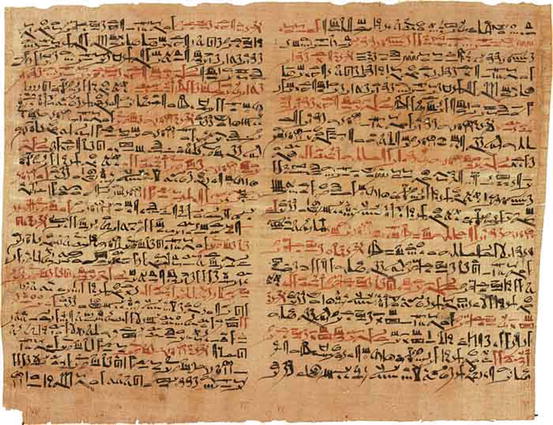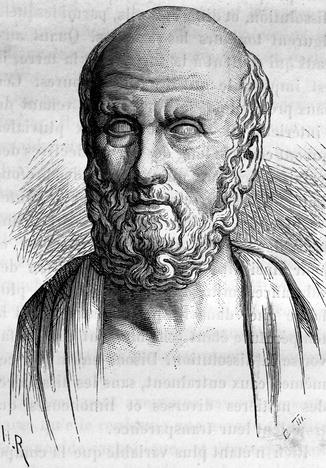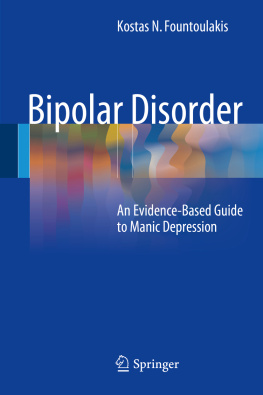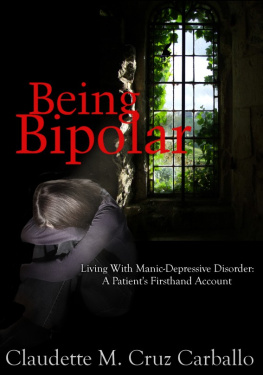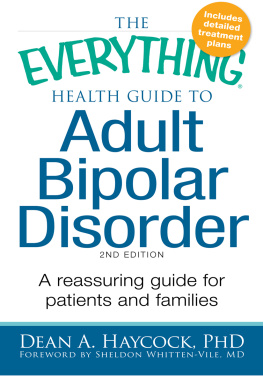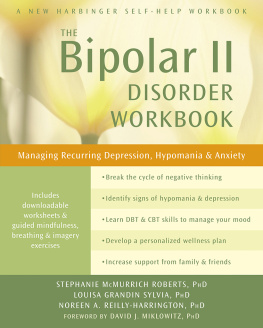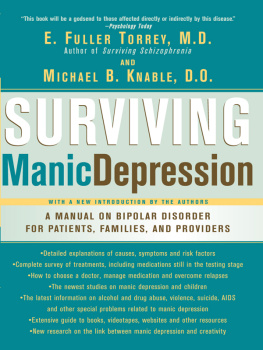1. Historical Perspective
1.1 Antiquity
The history of mood disorders and specifically of bipolar disorder (BD) is dated as back as 3000 BC in ancient Egypt, when depression and bipolarity were mentioned in Ebers papyrus (book of the heart; Fig. ) were the first to describe manicdepressive illness as mental illnesses.
Fig. 1.1
Ebers Papyrus (book of the heart); Egypt c. 3000 BC
Fig. 1.2
Hippocrates (460370 BC)
Fig. 1.3
Galen (131201 AD)
Fig. 1.4
Aretaeus of Cappadocia (second century AD)
The Hippocratic texts (today is believed to be the work of unknown authors) introduced the concept of the four essential body humours (phlegm, yellow bile, black bile and blood), secreted by different organs, possess different qualities and vary with the seasons. Early versions of this theory might had existed in ancient Egypt or Mesopotamia, but the essence of this approach is ascribed to the school of Cos and to Polybus which was a pupil and son-in-law to Hippocrates (fourth century BC) and author of the book (Peri physeos anthropou meaning On the Nature of Man). This theory is in fact a microcosmic form of the macrocosmic theory of the four elements (earth, water, air, fire) and the four qualities (dry, wet, cold, hot) as first proposed by Empedocles (fifth century BC). Essentially it was a model with two factors: humidity and temperature.
In the Hippocratic texts it is mentioned that yellow bile causes manic rage, while black bile (which was under the influence of the planet Saturn and related to autumn) caused melancholia (in ancient Greek melan = black, choli = bile), and this constitutes the very first biological model of a mental disorder. It is also important that they believed that the black bile causes melancholia because it influences the brain. Long-lasting anxiety, fear and moodiness were described as core characteristics of melancholia. Concerning mania, they believed that it is caused by excess of blood. Different patterns of body fluids was believed to underlie different idiosyncrasies (in Greek meaning unique or characteristic admixtures of elements, temperaments). It is interesting to mention that it was thought that yellow bile was responsible for the choleric temperament (irritable, hostile and given to rage) while phlegm for the phlegmatic (indolent, irresolute and timid).
These authors described and classified mania and melancholia for the first time. These two concepts are the oldest ones in psychiatry. Their view of mania probably corresponds to what we consider excited psychoses today, while melancholia corresponds to anxious fearful depression rather than what we today consider melancholic features.
The etymology of the word mania is interesting since it reflects the early concepts for this condition. It has the same root with the Greek words (menos) and (minis) which both mean anger. It is also related to the verb (meno = stay) and thus reflects a condition in which the state of the mind is stalled because of the intrusion of anger and intense emotions. Interestingly, in ancient Greek the word , which is related to the Latin word mens (=mind), also means crescent and thus relates the states of the mind with the phases of the moon. The Greek word for month (which corresponds to moon phases) is (minas), while the Latin word is mensis . This group includes also the words menses and menstrual, and thus they possess both a temporal/cyclical and an emotional meaning. The word (=maenad) used for women who participated in the orgiastic rites of God Dionysus and (meniscus of the knee) have a similar etymology. Peculiarly, in his book On acute diseases the Roman physician Caelius Aurelianus, which was a student of Soranus of Ephesus and member of the Methodist school, suggested several different etymologies. One of them relates mania to the Greek word (ania = dysphoric boredom), while another to the word (lymainin = devastate, defile). The other options include variations like (monousthae = seeks solitude) or (ypomonetikos = having patience). It is obvious that the term mania belongs to a group of words coming from the Ancient Greek language and refers to mind and its states, intense emotions and especially anger, crescent and phases of the moon, loneliness and patience.
While the term melancholia refers to black bile (as mentioned above), the modern term depression was derived from the Latin verb deprimere (=to press down). Since the fourteenth century, the word depression was used to denote a negative psychological state, and this was officially done in written language for the first time in 1665 in Richard Bakers Chronicle. The term is also used in other scientific disciplines like physiology and economics (e.g. the great depression of the 1930s). The French psychiatrist Louis Delasiauve (18041893) was the first to use the term in 1856. The term is equivalent to the German word niedergedruckt , the English downcast , the French abattement , the Spanish abatido and the Italian essere giu . The modern Greek translation of depression is (katathlipsi = overwhelming sorrow). The word means among others overwhelming, down and against, while it is to be noted that in Greek the verb (thlivo) means not only that I cause sorrow but also that I break into pieces. In this sense, the word also means total breaking and destruction.
Ancient Greeks described melancholia as a state of aversion to food, despondency, sleeplessness, irritability and restlessness, and they also recognized the close relationship between depression and anxiety. Also they were the first to recommend scientific, non-metaphysical therapeutic interventions, like personal hygiene, bathing and dieting so as to keep the humours in balance. They also used purgatives, cathartics and bleeding as a more aggressive attempt to reset the balance of humours in more difficult or emergency cases. At that period, psychological treatments were also available, including the interpretation of dreams as well as talking to encourage, console and understanding of the illness (Platos dialectics).
In general, during the times of ancient Greece and the Roman Empire, religion, science and philosophy were interplexed in the way mental illness was conceived. The psychological vs. somatic approach has its roots in that time period, and essentially it derives from the differences in the philosophical views of Plato (424348 BC) vs. Aristotle (384322 BC) (Fig. ). Aristotle was the first to describe accurately the affections of desire, anger, fear, courage, envy, joy, hatred and pity. He was the first to suggest a predisposition to develop melancholia in those who possess an excess of black bile (melancholic temperament), and additionally in his writings we find the first mentioning of a relationship between creativity and melancholic temperament.
